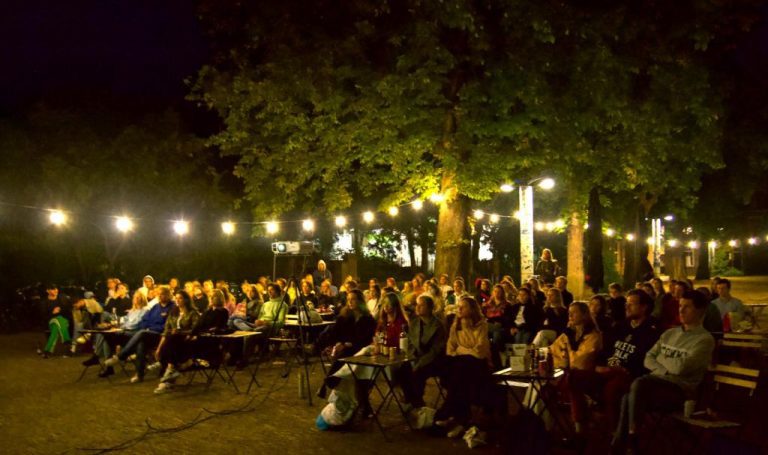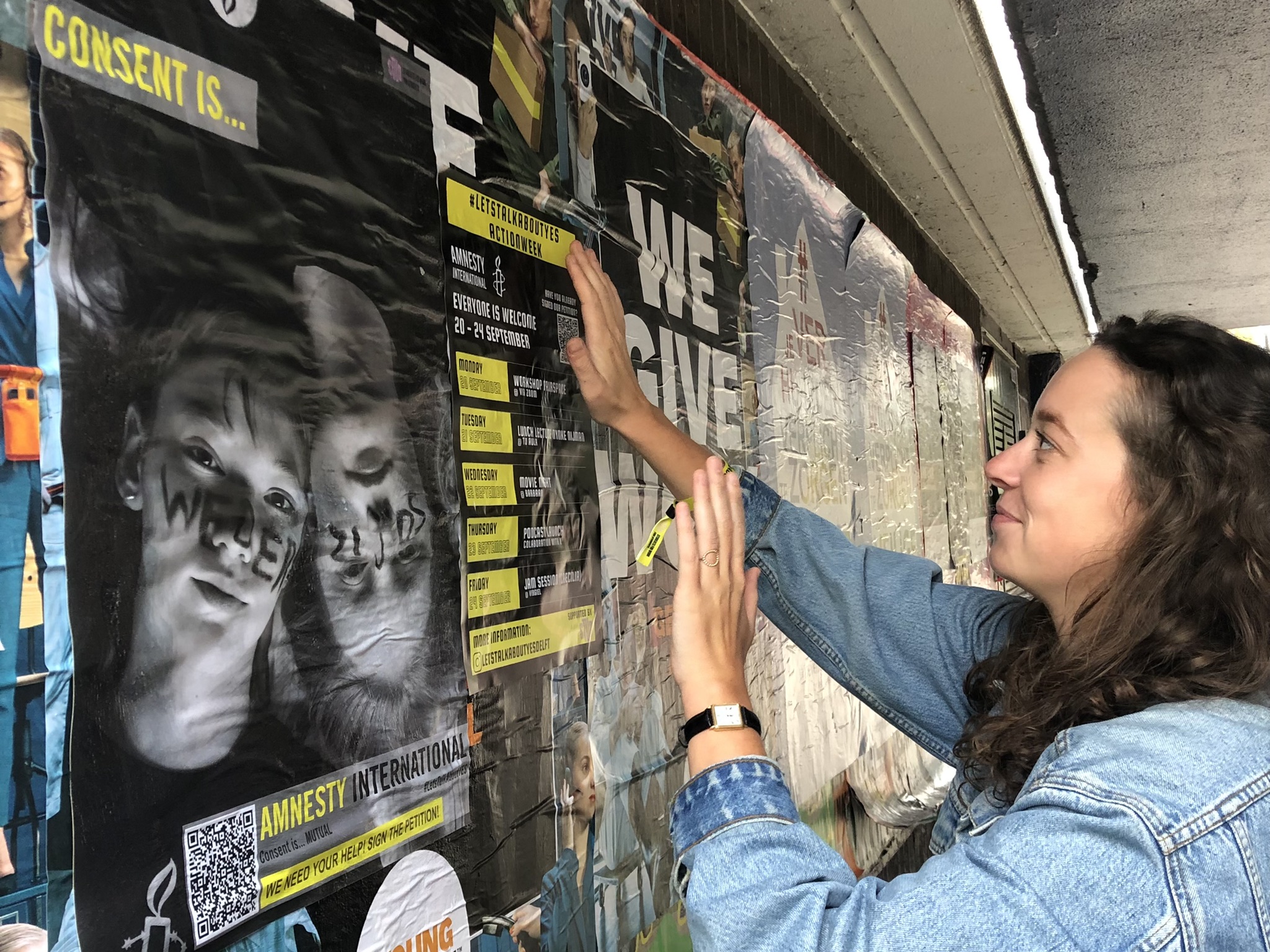Could the news about unacceptable behaviour at The Voice of Holland lead to a change in culture at TU Delft? These students hope so.
A volunteer puts up posters to draw attention to the Let's Talk About Yes action week. (Photo: Amnesty Delft)
To what extent could the news about unacceptable behaviour at The Voice of Holland, the television talent show, bring about a change in culture in the TU Delft community? Delta discussed it with three TU Delft students and Amnesty activists: Fenna Timsi, Angelina de Leur and Susanna Stam.
Confidential Advisor Sandra van der Hor said that she received three reports of sexual intimidation in 2020. Do you think that this reflects the degree in which sexual intimidation occurs at TU Delft?
“Amnesty research shows that one out of 10 female students and one out of 100 male students experience sexual intimidation,” says Fenna Timsi. “It is hard to know how often it gets reported as much of the problem lies in the phase prior to someone making a report. Students do not dare come forward. And if they do, reporting it is often a bigger part of the trauma than what was done to them. They have to deal with victim blaming (in Dutch) or not being taken seriously. To be honest, it’s not about the number of reports but what happens beforehand. We can only say something about the numbers if we deal with the stigma.”
‘In terms of policy, there is still a lot to do at TU Delft’
Does the news about The Voice help at all?
Angelina de Leur answers. “Luckily the uproar has meant that the issue is now up for discussion. But it is a shame that it is only talked about after an outcry like this and that there is not a culture in which you can address someone on their behaviour or on something that you experience as negative.”
Timsi adds that “During the Let’s Talk About Yes action week much attention was paid to it and we talked with TU Delft students about sex and consent. Since then we have seen students become more willing to discuss subjects like this more publicly and openly. At the action week we screened a documentary in an outdoor cinema called The Hunting Ground about rape on American campuses. We talked about the issue after the film. During the event a group of young guys with a crate of beer came and sat with us. Afterwards I heard them say that they were glad that they came and that they wanted to help create a safe environment for everyone. Only after something like this do students see what has actually been happening for a while in front of their eyes. You see a small culture change in this, but in terms of policy, there is still a lot to do at TU Delft.”
 The The outdoor cinema during the Let’s Talk About Yes action week. (Photo: Amnesty Delft)
The The outdoor cinema during the Let’s Talk About Yes action week. (Photo: Amnesty Delft)
Talking about that, TU Delft never signed the Amnesty Manifesto (in Dutch) but issued a general email to students and staff at the beginning of this week about ‘TU Delft must be a safe place’. What do you think of this?
“There is progress and that’s a good sign,” says Timsi, “But the emphasis still does not lie on dealing with the perpetrators to address the problem. How we deal with each other must change. If not, the culture will not change. TU Delft declared its solidarity in the email, but in the end, action speaks louder than words.”
What kind of actions could TU Delft take?
Timsi continues. “It would be good if TU Delft would offer workshops on issues like sexual intimidation. This would have a great impact. It is important that proper conduct is always practiced. It was clear that the presence of support desks alone did not help at John de Mol/Talpa. The women blamed themselves and did not report the incidents. You need to discuss and share the subject. The Executive Board should demonstrate clearly that they take this seriously. We held an online workshop during the action week which gave people useful tools that they could use immediately.”
TU Delft said that it was not in favour of workshops. Rob Mudde called them ‘impractical and ineffective’. They would prefer to reach students through student associations. Is that being done?
“Yes,” says De Leur, “we helped Virgiel with a workshop for their first years, for example. And other associations are moving ahead with it too. The only problem is that not all TU Delft students are members of associations, so you won’t reach a very large group.” Timsi adds that “Apart from that, board members of associations are students themselves. They are not professionals who can support their fellow students to process trauma or who have the right knowledge about teaching about sexual violence.”
‘Power relationships are everywhere: between professor and student, between student assistant and student.’
Don’t associations have confidential advisors for this though?
“They too are students!” says De Leur. “It is great that they are there but the associations need to recruit and train new members to do this every year. It would be much more effective if this would be centralised at TU Delft. Then there would be regular contact person for all students, whether they are members of an association or not. A person who would provide the same quality of care to everyone.”
Timsi adds that “Putting a job like this at the door of student associations is also unfair as students still come together through TU Delft. This is the common denominator. A safe environment would benefit everyone. Other universities signed the manifesto and are thinking about centralised action. Fortunately we will soon enter into discussion with TU Delft and other overarching student bodies again so there is hope.”
“They can then show if the email is nothing more than an empty promise,” says Susanna Stam.
What do you think the TU Delft community can learn about the abuse of power?
Stam says “I hope that people see that there are power relationships. They are everywhere: between professor and student, between student assistant and student. Every student wants to pass their modules and this means that everybody involved who is not a student has a certain power over the student. You know for certain that that relationship exists.”
“And there is still an unequal power relationship between men and women,” Timsi adds, “Especially in a student city like Delft where there are a lot more male students. Our society keeps a culture of normalising sexual violence going in which perpetrators do not have to take responsibility for their actions. This gives rise to victim blaming. So it is important that everyone works on changing this culture, even if you feel that you are not doing anything wrong directly yourself.”
Students who are the victim of unacceptable behaviour in the workplace can, just like staff, contact the Confidential Advisors. Are they the designated persons for this?
De Leur believes that they could be “if the organisation is changed. There were only a couple of confidential advisors for a long time, most of whom worked on scientific integrity. I found this surprising as it means that students won’t seek that contact quickly. In fact, you’re downplaying it as people wonder if they should contact an external confidential advisor for something ‘small’. Make it smaller scale and appoint a confidential advisor at each faculty. This will lower the threshold for students.”
“And it is important that the person knows how to respond if a student reports an incident involving this type of behaviour,” adds Stam.
- Have you experienced an unwanted sexual experience and do you want to talk about it? Then contact the Sexual Assault Center and talk to the specialists there. It may help to talk to the people around you.
- As one out of 10 students experience sexual intimidation, there is a good chance that you could offer someone a listening ear. If so, it is good if you know how you can best respond. The most important thing is that you stay calm. If you keep calm the other person can tell their story. See conversation techniques in #metoo gespreksetiquette (in Dutch).
- In the meantime, the team of Confidential Advisors at TU Delft has been added to. There are now four local Confidential Advisors at the faculties that work on unacceptable behaviour. Click here for more information.
Do you have a question or comment about this article?
m.vanderveldt@tudelft.nl


Comments are closed.